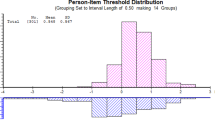Abstract
The present study evaluated the subjective happiness of Lebanese college youth using a multi-item rather than a single-item subjective happiness measure. An Arabic translation of the Subjective Happiness Scale (SHS) was administered to 273 Lebanese college youth from state- and private-run higher institutions of learning, as was the Arabic Adult Parental Acceptance-Rejection Questionnaire (Arabic PARQ). The reliability and validity of the Arabic SHS was tested in terms of factor analysis, internal consistency, and correlation with Arabic PARQ scores, as was the factorial invariance and relation of the scale across age, sex, marital status, birth order, and college campus. The Arabic SHS showed a reliable unitary structure similar to those found in other cultures, and factorial invariance across sex, marital status, birth order and college campus. While age, sex, marital status and birth order were independent of happiness scores, college students attending the private university reported greater happiness than those from the state-run academic setting. It was concluded that the Lebanese Arabic SHS is a reliable and valid measure of global subjective happiness, its factor structure is similar across other translated versions of the scale, and its scores are independent of age, sex, marital status and birth order.
Similar content being viewed by others
References
Abdel-Khalek, A. M. (2004). Happiness among Kuwaiti college students. Journal of Happiness Studies, 5, 93–97.
Abdel-Khalek, A. M. (2006). Measuring happiness with a single-item scale. Social Behavior and Personality: An International Journal, 34, 139–150.
Abdel-Khalek, A. M. (2008). Religiosity, health and well-being among Kuwaiti personnel. Psychological Reports, 102, 181–184.
Abdel-Khalek, A. M. (2010). Quality of life, subjective well-being, and religiosity in Muslim college students. Quality of Life Research, 19, 1133–1143.
Abdel-Khalek, A. M., & Naceur, F. (2007). Religiosity and its association with positive and negative emotions among college students from Algeria. Mental Health Religion and Culture, 10, 159–170.
Argyle, M., Martin, M., & Lu, L. (1995). Testing for stress and happiness: The role of social and cognitive factors. In C. D. Spielberger & I. G. Sarason (Eds.), Stress and emotion (pp. 173–187). Washington, DC: Taylor & Francis.
Ayyash-Abdo, H., & Alamuddin, R. (2007). Predictors of subjective well-being among college youth in Lebanon. The Journal of Social Psychology, 147, 265–284.
Extremera, N., Salguero, J. M., & Fernadez-Berrocal, P. (2010). Trait-mood and subjective happiness: A 7-weel prospective study. Journal of Happiness Studies. doi:10.1007/s10902-010-9233-7.
Faour, M. A. (2007). Religion, demography, and politics in Lebanon. Middle Eastern Studies, 43, 909–921.
Gorsuch, R. L. (1997). Exploratory factor analysis: Its role in item analysis. Journal of Personality Assessment, 68, 532–560.
Harb, C., & Smith, P. B. (2008). Self-construals across cultures: Beyond independence-interdependence. Journal of Cross-Cultural Psychology, 39, 178–197.
Howell, R. T., Rodzon, K. S., Kurai, M., & Sanchez, A. H. (2010). A validation of well-being and happiness surveys for administration via the Internet. Behavior Research Methods, 42, 775–784.
Kaiser, H. (1974). An index of factorial simplicity. Psychometrika, 39, 31–36.
Karam, E. G., et al. (2006). Prevalence and treatment of mental disorders in Lebanon: A national epidemiological survey. Lancet, 367, 1000–1006.
Lyubomirsky, S. (2001). Why are some people happier than others? The role of cognitive and motivational processes in well-being. American Psychologist, 56, 239–249.
Lyubomirsky, S., & Lepper, H. S. (1999). A measure of subjective happiness: Preliminary reliability and construct validation. Social Indicators Research, 46, 137–155.
Lyubomirsky, S., & Tucker, K. L. (1998). Implications of individual differences in subjective happiness for perceiving, interpreting, and thinking about life events. Motivation and Emotion, 27, 155–186.
Mattei, D., & Schaeffer, C. E. (2004). An investigation of the validity of the subjective happiness scale. Psychological Report, 94, 288–290.
McCullough, M. E., Emmons, R. A., & Tsang, J. A. (2002). The grateful disposition: A conceptual and empirical topography. Journal of Personality and Social Psychology, 82, 112–127.
Rohner, R. P., & Khaleque, A. (2005). Parental acceptance-rejection questionnaire (PARQ): Test manual. In R. P. Rohner & A. Khaleque (Eds.), Handbook for the study of parental acceptance and rejection (4th ed., pp. 43–106). Storrs, CT: Rohner Research Publications.
Salama, M. M. (1986). Perceived parental acceptance-rejection and personality dispositions among college students in Egypt. Egyptian Journal of Mental Health, 27, 145–163.
Shima, S., Otake, K., Park, N., Peterson, C., & Seligman, M. E. P. (2006). Convergence of character strengths in American and Japanese young adults. Journal of Happiness Studies, 7, 311–322.
Shima, S., Otake, K., Utsuki, N., Ikemi, A., & Lyubomirsky, S. (2004). Development of a Japanese version of the subjective happiness scale (SHS), and examination of its validity and reliability. Nippon Koshu Eisei Zasshi, 51(10), 845–853.
Spagnoli, P., Caetano, A., & Silva, A. (2010). Psychometric properties of a Portuguese version of the subjective happiness scale. Social Indicators Research. doi:10.1007/s11205-010-9769-2O.
Swami, V. (2008). Translation and validation of the Malay subjective happiness scale. Social Indicators Research, 88, 347–353.
Swami, V., Stieger, S., Voracek, M., Dressler, S. G., Eisma, L., & Furnham, A. (2009). Psychometric evaluation of the Tagalog and German subjective happiness scale and a cross-cultural comparison. Social Indicators Research, 93, 393–406.
Uchida, Y., Norasakkunkit, V., & Kitayama, S. (2004). Cultural construction of happiness: Theory and empirical evidence. Journal of Happiness Studies, 5, 223–239.
Author information
Authors and Affiliations
Corresponding author
Appendix
Appendix

Rights and permissions
About this article
Cite this article
Moghnie, L., Kazarian, S.S. Subjective Happiness of Lebanese College Youth in Lebanon: Factorial Structure and Invariance of the Arabic Subjective Happiness Scale. Soc Indic Res 109, 203–210 (2012). https://doi.org/10.1007/s11205-011-9895-5
Accepted:
Published:
Issue Date:
DOI: https://doi.org/10.1007/s11205-011-9895-5




